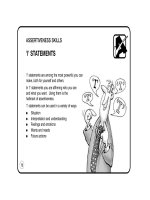THE CHALLENGERS POCKET BOOK phần 5 ppsx
Bạn đang xem bản rút gọn của tài liệu. Xem và tải ngay bản đầy đủ của tài liệu tại đây (118.74 KB, 10 trang )
CHALLENGERS
THE REFEREE/PEDANT
Agree/Disagree
First agree with their interruption and thank them, but then point out that you'd like to ask
for a little flexibility so that the whole group can benefit from the course.
Psychological Judo
Ask them to be the group 'auditor' or 'referee'. Explain how difficult it is for you to lead
the course and at the same time ensure discipline. Request that they ensure everyone
(including you) sticks to the rules. Give them a whistle or yellow card to use every time
anyone transgresses. (They'll very soon get fed up with this official role.)
41
CHALLENGERS
THE RIVALS
Profile
● Two representatives of different departments or different schools of thought who use
the course to 'get at' each other.
● Make humorous, sarcastic or even aggressive put-downs of each other.
● Use course material as ammunition against one another.
Confrontation
Ask them to keep their rivalry
for outside the training room
in the interests of other
participants.
42
CHALLENGERS
THE RIVALS
Psychological Judo
Institutionalise their rivalry. Appoint each to the head of a team. Create exercises where
they can compete. Ask each to make a presentation of their group findings. (This will
channel their competitive energy toward the course topics and not 'back-on-the job'
problems.)
Reflect/Deflect
Address both of them and say something like: 'If I understand correctly, you'd like to use
this course as a duelling ground and try and score points off each other?' Wait for reply,
then deflect: 'How does the rest of the group feel about this situation?'
Refocus
Give each an absorbing role/task within their group (example: scribe, facilitator, in charge
of the recap session) to use up their spare 'duelling' energy.
43
CHALLENGERS
THE SHOW-OFF
Profile
● Feels undervalued, seeks spotlight to 'prove' himself/herself
to others.
● Not interested in helping you, only in impressing the others.
● Puts you down in order to score points.
● Monopolises discussions.
● Alienates other participants.
Blockbusting
Ask for specifics. Refer to their own words and ask for
details which will support/reinforce your message.
44
CHALLENGERS
THE SHOW-OFF
Reflect/Deflect
Give a chance to the group or an individual to censor them. Example from a team
meeting:
'Great! It sounds like you've had a lot of experience in this area. Right?' (Wait for falsely
modest reply and deflect to group with a smile). 'Anyone like to challenge X's expertise
on this one?'
Or deflect to an individual/expert: 'Bill, would you agree with X's position on this one?'
Psychological Judo
● Ask for a mini-presentation on a difficult subject in front of the group. Encourage
showing off until they realise they will make a fool of themselves by continuing.
● Ask for help with a very difficult question in an area in which you know they are weak.
● Give them a special task to occupy their attention and provide the spotlight. (See
also The Expert.)
45
CHALLENGERS
THE SHY VIOLET
Profile
● Avoids eye contact.
● Blushes easily.
● Speaks rarely and in a quiet voice.
● Never volunteers information.
Building
Build on their rare contributions.
For example: 'Yes, that's absolutely right and
you'll also find that '
Questions
Ask easy closed questions to boost their ego.
Show appreciation for the right answer.
46
CHALLENGERS
THE SHY VIOLET
Naming
Use their names in examples and metaphors to boost their confidence: 'Let's imagine
that Rick and Jennifer had a problem with the warehouse team '
Psychological Judo
(Rarely necessary but extremely powerful.)
Prescribe the 'silent' symptoms by asking them to remain quiet - but make it relatively
unattractive to do so. Wait until after a break and address the whole group. Say
something like: 'You all noticed before the break that this is a very open course and I'd
like to hear from everybody. However, I realise that some people who are shy and timid
don't like to speak in front of their colleagues. This is perfectly OK and I understand their
feelings. So if you feel you'd rather not contribute because you're shy that's fine.' (Look
at an open, more talkative participant). 'There are several other people who'll
compensate by giving us their opinions loud and clear!' You’ll find that the first person to
intervene is one of the shy violets!
47
CHALLENGERS
THE SILENT CYNIC
Profile
● Demonstrates bored body language (reads, fiddles, looks around constantly, fidgets).
● Rolls eyes and exhales following your or other participants' affirmatives.
Reflect/Deflect
Say something like: 'You don't seem to fully agree with ABC ?'
Or: 'You seem to have some doubt about this one ?'
Let them answer.* Then deflect to one or all of the participants.
'Would anyone (Harry?) like to disagree with X on this?'
This will give you time to think of your own
counter-arguments to add.
*It is important to make them verbalise their
disagreement or cynicism.
48
CHALLENGERS
THE SILENT CYNIC
Confrontation
Point out that the objective of the course is to discuss openly, and move towards a
positive outcome. If the cynic isn't willing to co-operate ask him/her to leave.
Psychological Judo
Appoint as class 'cynic' (explain the original Greek meaning: contempt for ease and
pleasure. One who doubts human sincerity and merit). Ask for regular, well-reasoned
refutations of your or other participants' arguments to ensure that 'we don't just accept
things automatically'. Generally speaking the less opposition cynics receive the more
they will rally to the cause.
Reframing (Consequences)
As with the Griper ask a reframing question like: 'You obviously find it painful working in
this environment. How would you handle this unnecessary course?' Then deflect
suggestions to the group.
49
CHALLENGERS
THE SLOWCOACH
Profile
● Keeps getting it wrong!
● Consistently volunteers remarks and asks
questions which show he/she hasn't understood
what's been happening.
● Answers questions incorrectly.
After remarks which demonstrate lack of understanding:
Reframe (Relevance)
Try and adopt the mind-set that you have done a bad
job of explaining (difficult!) and say something like:
'Help me to see how what you're saying fits in with
what we've been discussing?' Try and channel
the response back to the subject, with thanks.
50









